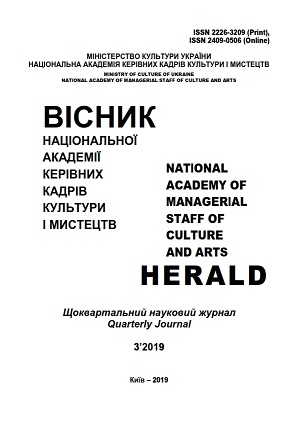The Genesis of Library Censorship in the Thirties of the 20th Century Within the Context of Ukrainian Cultural Heritage Formation
The Genesis of Library Censorship in the Thirties of the 20th Century Within the Context of Ukrainian Cultural Heritage Formation
Author(s): Olena Oleksandrivna KarakozSubject(s): Cultural history, Library operations and management, Political history, Government/Political systems, Interwar Period (1920 - 1939)
Published by: Національна академія керівних кадрів культури і мистецтв
Keywords: purging of library collections; totalitarianism era; library censorship; repression; repressed writers; Ukrainian intellectual class;
Summary/Abstract: The purpose of the article is to study the main methods of introducing Soviet-era censorship policy in the libraries of Ukraine in the 1930s, to review the specifics and procedures of control by the state authorities over library collections. Methodology of the research is based on the use of scientific methods, first of all, analysis, synthesis, statistical, as well as special historical approaches, in particular: problem-chronological, historical-comparative and historical-genetic, which made it possible to explore the totalitarian regime`s methods of controlling of dissenting view through the implementation of total censorship, mechanisms of the public`s mind manipulation and a new Soviet mindset formation. The scientific novelty of the research lies in the analysis based on the recent evidence of the implementation methods of putting censorship into librarianship by the Soviet authorities. Conclusions. The work principles of the Soviet censorship institutions, which limited the libraries` activity focus, turning them into institutions of political propaganda, were clarified. Library censorship is shown as a social phenomenon; its importance is analyzed for access limitation to information and the printer`s ink. It has been proved that the mass ―purging‖ of library collections, the creation of slush funds and restricted-access collections have brought the destruction to a large number of books and the general cultural stagnation. The formation of an information vacuum through providing users with ideologically oriented publications testified to mental violence, deformation of the public`s mind and blocked the development of both national and world culture.
Journal: Вісник Національної академії керівних кадрів культури і мистецтв
- Issue Year: 2019
- Issue No: 3
- Page Range: 101-106
- Page Count: 6
- Language: English

